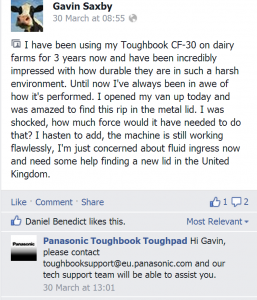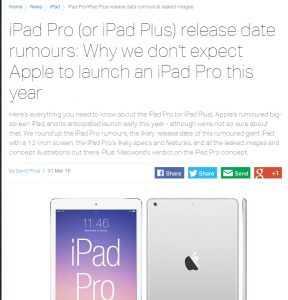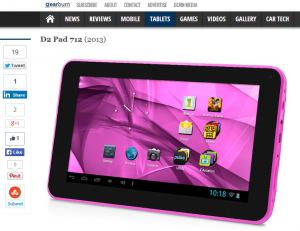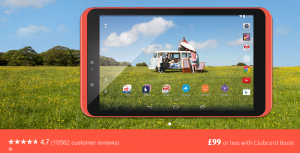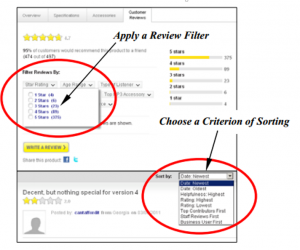If you’re looking for popularity or just general recognition then Electronic word of mouth could be your outlet!
The increase of channels for media to be publicised has increased in recent years, the use of web 2.0 tools have become very popular. Web 2.0 is the user generated content on the web and can be abundantly accessible on outlets such as blogs, social networks, discussion forums, emails, review websites, and many more. It’s a great way for users to connect and converse about products and services. The interaction between users is can be referred to as Electronic word of mouth (eWOM).
eWOM can be more credible to consumers than other outlets of information as users trust there online friends and don’t expect spam or viruses to come from trusted sources. eWOM has unquestionably been an influential promotion tool in the tablet industry in recent years. Some example of eWOM being beneficial to an organisation is an article created by fans, in order to boost the excitement around a new product.
The impact of conversational exchanges
The following examples of eWOM will create an insight into the conversational exchanges that take place online and how this could have an impact on your organisations reputation. Highlighting the need to encourage positive eWOM and create outlets for consumers to post reviews in order to gain opinions and use them to consistently improve a product or service. Organisations can also be involved in the eWOM and post responses in order to gain excitement for a new product or offer help and advice on an existing one, for example this exchange on Panasonic’s Facebook page.
Panasonic Facebook. (2015). Panasonic Toughbook Toughpad Facebook.
Anticipation article with response
Macworld (UK) is an independent journal not affiliated with Apple, Macworld’s Online Editor, David price writes reviews and tutorials on Apple products. This online speculation post enables users to give their opinions and get involved with the anticipation below is an example.
Price. D. (2015). iPad Pro (or iPad Plus) release date rumours: Why we don’t expect Apple to launch an iPad Pro this year.
There is positive comments and reviews posted alongside the article and therefore the enthusiasm and approval will positively impact the tablet sales. An example of a positive comment and exchange of online chat is the comment on the Macworld (UK) page exclaiming…
“I love my iPad. I love my iPhone, and I love my MacBook Pro as well as my Mac Pro. They all serve a purpose, and yes they sometimes overlap, but it’s hard imagining life without any one of these devices in my arsenal.” Deserteagle911 (2015) .
The impact of negative articles
The downfall for organisations is that they cannot control the content being shared nor predict how quickly it was spread. An example of eWOM having a negative impact is an article which was published titled ‘5 of the worst tablets ever made’ By Pippa Tshabalala. Here she names Blackberry PlayBook (2011), D2 Pad 712 (2013), Toshiba Excite (2013), Coby Kyros MID7047 (2013) and Hipstreet Titan XK HS-7DTB4 (2013). Pippa is currently the On-Air Producer for MTV Base and a 2013 Brand Ambassador for Adidas South Africa and therefore her opinions can be highly influential. The article may have swayed a large audience as the readers have the option to share the article onto social media.
Tshabalala. P. (2015). 5 of the worst tablets ever made.
“D2 Pad 712 (2013) is completely underwhelming. That’s probably the best compliment I can hand out. A terrible 800×400 display that looks fuzzy and low res (probably because it is), combines with hideous lag and poor performance.” Tshabalala. P (2015).
Christy et al (2012) assessed 25 individual-level eWOM studies and recognised variables associated with four significant components; “responses, stimuli, receivers, and communicators”. The results uncovered that ‘attitude’, ‘eWOM adoption’ and ‘eWOM volume’ positively influence purchase intention. J. Lee et al (2008) examined the influential nature of negative consumer reviews to consumers, finding that consumers are more discouraged as the proportion of negative reviews rises so the volume of positive eWOM is highly important. This is why it is so significant for organisations to market their brand positively on a wide scale.
The impact of inspirational advertising
In regards to Christy et al (2012) theory of ‘eWOM adoption’, users are more likely to adopt the eWOM if they are motivated, therefore organisations could use marketing which will motivate consumers to have a positive attitude and express it via eWOM. Inspiration can be created through company reputation such as the apple web page.
“See inspiration at work. Watch how real teachers and schools around the world are using Apple products to reinvent learning.”Apple. (2015).
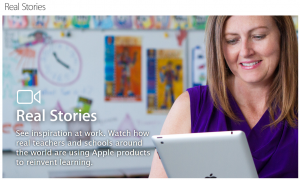
Apple. (2015). Real stories.
Jeanne Halderson, a Middle School teacher explains the usefulness of the iPad and this video is also available on Youtube and video blogging sites and so can be shared in order to reach a wide audience. This promotional campaign is available on the Apple web page and has also been submitted by a member of the public to YouTube.
Youtube, tano9999. (2015). Apple – Education – Real Stories – Jeanne Halderson.
The factors that Christy et al (2012) found to positively influence EWOM adoption were found to be the ‘type of review platform’, the eWOM ‘credibility’, ‘valence’ and ‘sidedness. Source credibility is linked with eWOM credibility. Companies could encourage credible eWOM by including a review site and links to social media on their web page, this would ensure that consumers can easily find links to credible sources as oppose to being uncertain about reliability of the site. Examples of these links on a web page are show here with Tesco’s Hudl, they illustrate that they have been awarded 4.7 stars, gained from 10553 customer reviews.
The impact of reviews
Tesco. (2015). Hudl 2 – The new 8.3″ tablet.
The web page also offers useful rating measurements and constructs an easy to read rating system. With a ‘Rating Snapshot’ and a breakdown of the ‘Average Customer Ratings’, its simple and convenient for readers to gain insight into the product and make sense of the eWOM.
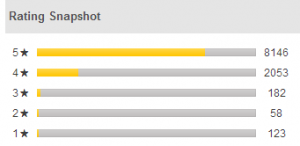
Tesco. (2015). Hudl 2 – The new 8.3″ tablet.
These reviews are consumer generated and so therefore are trustworthy to a viewer as they’re the opinions of like minded people and not just the opinion of the organisation trying to sell you the product. Organisations should be careful about using there own recommendations as viewers may become suspicious of the true intentions of the influential technique and so may not be convinced by this type of review. The quality of the review is highly important as low quality reviews are less likely to influence a consumer (J. Lee et al 2008).
Christy et al (2012) found that the quality of the eWOM was found to influence the receiver’s perception of the information usefulness. Consumer involvement can also have an impact on the way the consumer perceived the eWOM, this can be positive or negative depending on the association. The involvement that a person has with a particular product or brand means that eWOM can be less effective on some consumers as they already have preconception and so are less influenced (J. Lee et al 2008).
Lingyun et al (2011) recognises that data can be highly overwhelming and so propose that organisations make use of the filter options when offering reviews to users. In Figure 1, it is illustrated how the reviews can be “ordered by date, helpfulness, rating, or reviewer category.”
Lingyun et al (2011) The sorting and filtering functions on an eWOM System.
This type of systematisation can improve the usability of the webpage and therefore consumers will have a more positive attitude. The limitation is that users can sort the reviews in order of negative to positive, meaning they would have easy access to all of the negative reviews and may be influenced by the negativity.
As demonstrated, the eWOM can be very powerful and consequently it is integral that all organisations pay careful attention to the eWOM which is being speculated about them. This will prevent bad reputations spreading quickly and prove to the consumers that they’re important and the opinions and feedback that they give is valued. Constant exchanges illustrate that customer service is key to the company and therefore some consumers may be influenced by the indication that they will receive excellent customer service. Organisations can reap the rewards of constant feedback, reactions, advice and opinions and therefore improve the efficiency of their tablets in the future.
References
- Apple (2015). Real stories.Available: http://www.apple.com/uk/education/real-stories/ Last accessed 06/04/15.
- Christy M.K. Cheunga, and Dimple R. Thadan. (2012). The impact of electronic word-of-mouth communication: A literature analysis and integrative model. Decision Support Systems. Volume 54, Issue 1, 461–470.
- J. Lee, Lee, D.H. Park, I. Han (2008) The effect of negative online consumer reviews on product attitude: an information processing view. Electronic Commerce Research and Applications, 7 (3), pp. 341–352
- Panasonic Facebook. (2015). Panasonic Toughbook Toughpad Facebook.. Available: https://www.facebook.com/ToughbookToughpad. Last accessed 06/04/15.
- Price. D. (2015). iPad Pro (or iPad Plus) release date rumours: Why we don’t expect Apple to launch an iPad Pro this year.Available: http://www.macworld.co.uk/news/ipad/ipad-pro-plus-release-date-rumours-leak-apple-watch-3492180/. Last accessed 06/04/15
- Qiu, Lingyun and Wang, Weiquan, (2011). “The Effects Of Message Order And Information Chunking On eWOM Persuasion” PACIS 2011 Proceedings. Paper 151. Available online : http://aisel.aisnet.org/pacis2011/151 Last accessed : 03/04/15
- Tshabalala.P. (2015).5 of the worst tablets ever made. Available: http://gearburn.com/2014/02/5-of-the-worst-tablets-ever-made/. Last accessed 06/04/15.
- (2015). Hudl 2 – The new 8.3″ tablet. Available: http://www.tesco.com/direct/hudl/. Last accessed 06/04/15
- Youtube, tano9999. (2015). Apple – Education – Real Stories – Jeanne Halderson. Available: https://www.youtube.com/watch?v=ByenYUEXhxM. Last accessed 06/04/15.

